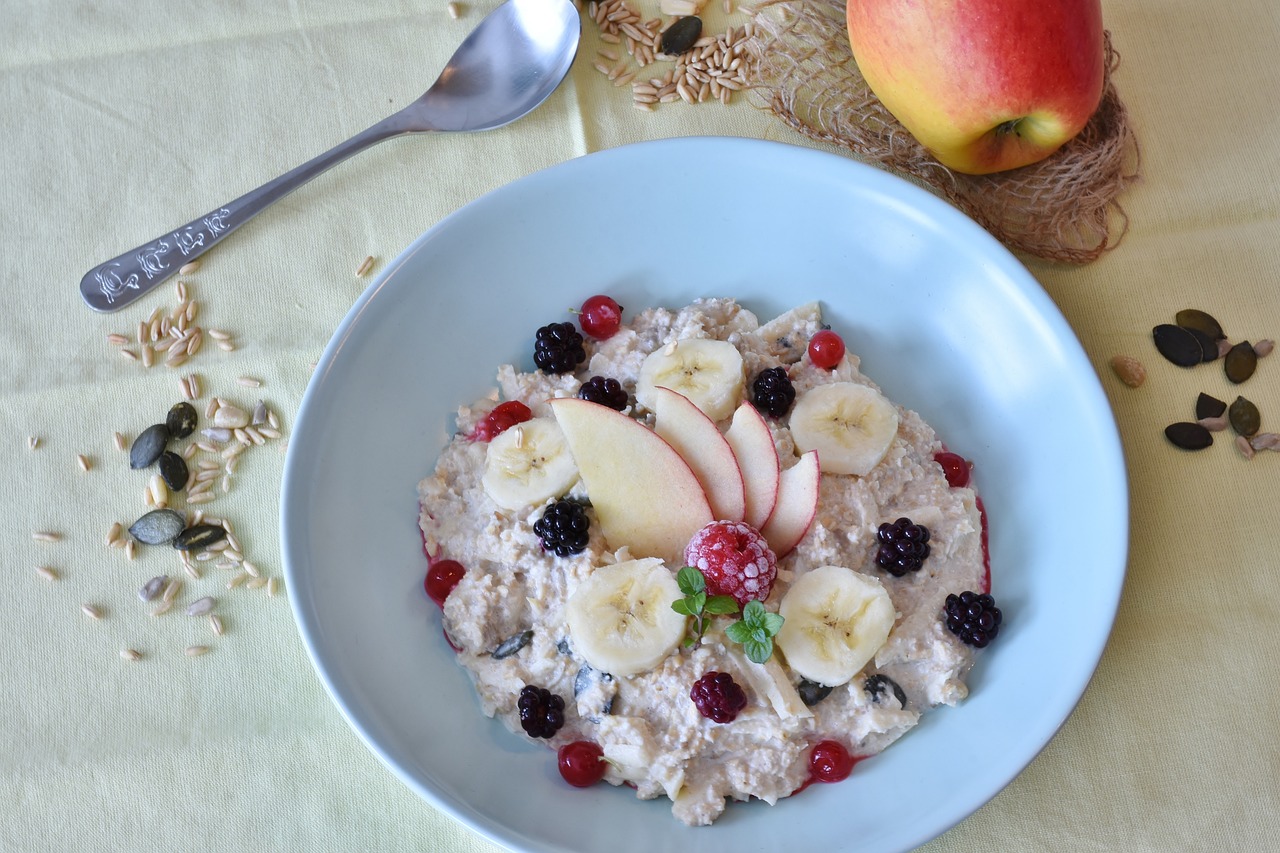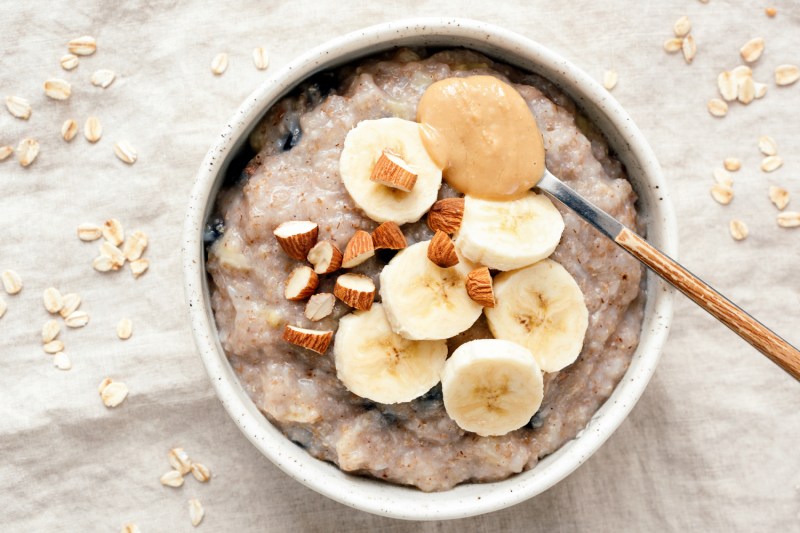Losing weight by being in a calorie deficit can be difficult. It is no wonder that many people looking to reduce the number on the scale try to control their diet by seeking out foods that make weight loss easier.
“Is oatmeal good for weight loss?” is one popular question related to losing weight because oatmeal is often touted as a great option for a healthy breakfast. Let’s find out if this food’s popularity holds any water as we examine its properties and nutrients, as well as how it impacts your body.
How do specific foods help with weight loss?

Specific foods aid weight loss primarily by boosting satiety, enhancing metabolism, or providing fewer calories per volume. High-fiber foods like vegetables and whole grains boost satiety and metabolism because the body works harder to digest them. This means that you burn more calories digesting these types of foods, making a calorie deficit and weight loss easier.
Moreover, whole foods usually have fewer calories per volume than processed foods. Consequently, it is easier to maintain a calorie deficit with whole foods than with processed foods.
Protein-rich foods and high-protein diets also increase satiety and help preserve muscle mass during weight loss, which keeps the metabolism active. Foods rich in water, like fruits and soups, add volume to your meals without extra calories, helping you eat less overall.
Additionally, some foods, like peppers, contain compounds that can slightly increase calorie burning, adding a minor metabolic boost. Peppers, in particular, contain capsaicin, a compound that reduces insulin resistance and lowers appetite.
Is oatmeal good for weight loss?

Oatmeal is good for weight loss because it is high in fiber, particularly beta-glucan, which promotes satiety by slowing digestion and keeping you full longer. Oatmeal is also relatively low in calories but nutrient-dense, providing essential vitamins and minerals.
Eating oatmeal for breakfast can help stabilize blood sugar, which may prevent energy crashes and cravings later in the day. Just be mindful of portion sizes and avoid adding too much sugar or high-calorie toppings.
Nutrition facts about oatmeal

Here’s the nutritional value of 100 grams of oatmeal, according to Food Data Central:
- Calories: 56 kcal
- Protein: 2.12 g
- Carbs: 12.19 g
- Fiber: 2 g
- Fats: 0.46 g
- Sugar: 0.41 g
Oatmeal also contains other nutrients, including calcium, magnesium, iron, potassium, sodium, phosphorus, and choline.
Benefits of eating oatmeal regularly

Improved heart health
Oatmeal is rich in a type of soluble fiber called beta-glucan, which helps lower LDL (bad) cholesterol levels. This fiber binds with cholesterol-rich bile acids in the intestines, allowing them to be excreted from the body.
By reducing LDL cholesterol, oatmeal can support cardiovascular health and lower the risk of heart disease. Additionally, oats contain antioxidants called avenanthramides, which may improve blood flow by helping to reduce inflammation in blood vessels.
Better blood sugar control
Oatmeal has a low glycemic index because of its fiber content, and this slows down the absorption of sugar into the bloodstream. This slow digestion helps prevent blood sugar spikes and can improve insulin sensitivity over time.
For people with type 2 diabetes or insulin resistance, oatmeal can be a helpful part of breakfast. It provides a steady energy source without causing large fluctuations in blood sugar levels.
Enhanced digestive health
The fiber in oatmeal promotes healthy digestion in two ways. Soluble fiber, like beta-glucan, helps to add bulk to stools and can relieve constipation by aiding regular bowel movements.
Insoluble fiber also acts as a prebiotic, feeding the good bacteria in the gut and supporting a balanced microbiome. A healthy gut microbiome has been linked to various benefits, including improved immunity, reduced inflammation, and better overall digestion.
How to add oats to your diet

1. Oatmeal breakfast
The most common way to consume oats is as a hot breakfast cereal. Cook rolled or steel-cut oats with water or milk, and add toppings like fresh fruit, nuts, seeds, or a drizzle of honey. For variety, you could add spices like cinnamon or nutmeg.
2. Overnight oats
Prepare your oats the night before by mixing rolled oats with your choice of milk or yogurt and letting them soak in the fridge overnight. In the morning, you can top them with fruits, nut butter, or granola. Overnight oats are convenient for a grab-and-go breakfast.
3. Oat smoothies
Add a handful of oats to your smoothie for extra fiber, texture, or healthy calories. Blend them with fruits, vegetables, protein powder, and a liquid of your choice, such as almond milk or water.
4. Baking with oats
Incorporate oats into baking recipes like muffins, cookies, or granola bars. You can substitute a portion of the flour with oats or use them as the main ingredient for a healthier treat.
5. Adding oatmeal to savory dishes
For a savory twist, use oats as a base for dishes like savory oatmeal with vegetables, avocado, and a poached egg, or in place of breadcrumbs in meatballs or veggie patties.
6. Making oatmeal-based snacks
Prepare homemade granola or energy bites by mixing oats with ingredients like nut butter, dried fruits, seeds, and a bit of sweetener. These could serve as quick, healthy snacks you can munch on throughout the day.
Frequently asked questions

Are there any downsides to eating oatmeal?
Oatmeal is healthy and well-tolerated by most people. However, it may cause bloating in some individuals due to its high fiber content. Start with smaller portions if you’re not used to high-fiber foods, and drink plenty of water to aid digestion. Also, be mindful of added sugars or high-calorie toppings that could negate its weight-loss benefits.
Is oatmeal good to lose belly fat?
Oatmeal can be beneficial for reducing belly fat because of its high fiber content, which helps control appetite and decrease overall body fat. However, targeting belly fat requires a balanced diet and regular exercise, as no single food can selectively burn fat in one area.
How much oatmeal should I eat for breakfast to lose weight?
A half-cup of dry oats (which cooks to about one cup) is a common portion size for weight loss. This serving provides a good balance of calories, fiber, and protein to keep you full without overdoing your calorie intake.




